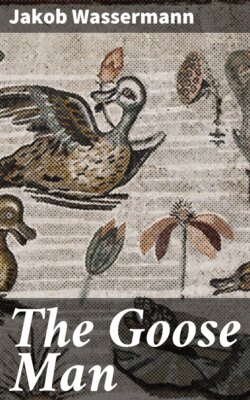Читать книгу The Goose Man - Jakob Wassermann - Страница 35
На сайте Литреса книга снята с продажи.
VI
ОглавлениеTable of Contents
Benda’s absence lasted for hardly a year. His mother had not accompanied him this time. She was not feeling well, and there was some danger that she was losing her eyesight.
After his return he took to silent brooding. Though he never said a word to his mother about the disappointment he had experienced, she knew precisely what he had gone through, and spared him the humiliation that would have followed any questions she might have asked.
He was oppressed by the memories the house awakened in him. Forgotten pictures became living ones. The figure of the murdered woman appeared in the nighttime on the balcony. Her shadow fell upon him, nestled up to him in fact, as he sat at his writing-desk.
There were a great many things that still bound him to her whose spirit had vanished from the earth, though her body remained.
It was impossible for him to forget her gentle look or the coyness of her hands. He knew her fate; he knew her soul. But he was condemned to silence. To withdraw from contact with the world and into the deepest of loneliness had been her lot; it had also been his. At present it was possible to get only one picture of her, the one her brother had given: she sat in her cell and combed her yellow hair.
He held no one responsible; he blamed no one. He merely regretted that men are as they are.
A former university friend of his came in, and tried to get him interested in collaborating on a great scientific work. He declined. As soon as his colleague of other days had gone, he visualised to himself the entire conversation: The man was affable and insistent; and yet there was in his very being an underground, enigmatic hostility. It was the hostility he invariably felt whenever he had anything to do, either of a purely external, business nature or in a social way, with men of other faith. The least he had to fear was a prejudiced inimicality, as if the individual in question were on the point of calling out to him: You stay on that side, I’ll stay on this. Keep off the bridge.
He was fully aware of this, but his pride forbade his fighting against it. He renounced his natural right to life and a living. He declined the university conceded privilege of co-existence. To go out and actually win for himself the right to participate in the inevitable contest of forces, or to secure even this poor privilege by supplication, or to defend it by argument, or to cajole it into his possession by political wiles, seemed to him contrary to reason and at odds with common sense. He would not do it.
He refused to knock at the door which he himself had bolted and barricaded.
From this self-imposed embarrassment he suffered to an almost intolerable degree. It was the irrational and fraudulent phase of matters that made him suffer. Did men act as they did because they were so strong in their faith? Not at all. Did he believe in those racial differences which made them believe? Not at all. He felt at home on the soil that nourished him; he felt under obligations to the weal and woe of his people; he was bound heart and soul to the best of them, and realised that he had been spiritually developed by their language, ideas, and ideals.
Everything else was a lie. They knew that it was a lie too, but out of his pride they forged a weapon and turned it against him. To deny his relationship to them, a relationship that had been proved by his achievements and enthusiasm, was a part of their plan; it was also a part of their evil designs.
To strike up acquaintances, seek out congenial companions, or take an active part in social organisations was repulsive to him. He did not care to be dragged into fruitless and empty community of effort or social co-operation. Defiant and alone, he explained his case to himself. Since it merely intensified his agony to compare his lot with that of others who seemed to be similarly situated, he did not do it. He avoided in truth all reflections that might have made the world appear to him as having at least a semblance of justice.
He was consequently filled with a longing which took more definite shape day by day, and finally developed into a positive and irrevocable decision.
About this time he made the acquaintance of Daniel, and through him he came to know other people. He saw at once that there was something unusual about Daniel; that there was something in him which he had never before noticed in any one. Even his outer distress was a challenge to greater activity, while his inner agitation never permitted his associates to rest in idle peace.
It was not easy to be of assistance to him; he rejected all gifts which he could not repay. He had to be convinced first of his duty and indebtedness to the friend whom fate had made cross his path. And even then he stood out for the privilege of being theoretically ungrateful.
Benda and his mother succeeded in getting him a position as a tutor in some private families. He had to give piano lessons to young boys and girls. The compensation was not great, but it at least helped him out for the time being.
After the day’s work was done, the evenings and nights bound the two more and more firmly together.
